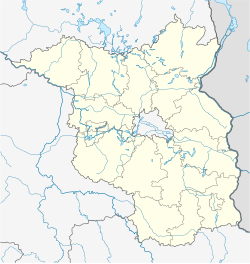Rheinsberg (German: [ˈʁaɪnsbɛʁk] ) is a town and a municipality in the Ostprignitz-Ruppin district, in Brandenburg, Germany. It is located on lake Grienericksee and the river Rhin, approximately 20 km (12 mi) north-east of Neuruppin and 75 km (47 mi) north-west of Berlin.
Rheinsberg | |
|---|---|
 Schloss Rheinsberg | |
Location of Rheinsberg within Ostprignitz-Ruppin district  | |
| Coordinates: 53°5′54″N 12°53′45″E / 53.09833°N 12.89583°E | |
| Country | Germany |
| State | Brandenburg |
| District | Ostprignitz-Ruppin |
| Subdivisions | 17 Ortsteile |
| Government | |
| • Mayor (2017–25) | Frank-Rudi Schwochow[1] |
| Area | |
• Total | 324.83 km2 (125.42 sq mi) |
| Elevation | 61 m (200 ft) |
| Population (2022-12-31)[2] | |
• Total | 7,948 |
| • Density | 24/km2 (63/sq mi) |
| Time zone | UTC+01:00 (CET) |
| • Summer (DST) | UTC+02:00 (CEST) |
| Postal codes | 16831 |
| Dialling codes | 033931 |
| Vehicle registration | OPR |
| Website | www.rheinsberg.de |
History
editFrederick the Great, while still Crown Prince, designed and moved into a restored chateau in Rheinsberg shortly after his 1733 marriage to Elisabeth Christine of Brunswick-Bevern. Here he experienced his "Rheinsberg Period", an era marked by regular correspondence with Voltaire, boisterous celebration in the company of minor philosophers and musicians, and the writing of several works of political theory, including the Anti-Machiavel.[3]
Crown Prince Frederick lived in the castle in Rheinsberg with his wife until he became King of Prussia in 1740 upon the death of his father, Frederick William I. He immediately banished his wife to Schönhausen Castle in the district of Berlin that is today called Pankow. King Frederick never visited his Queen and she was not allowed to visit him. She lived alone in her castle in Pankow until her death in 1797.
In June 1744, Frederick the Great gave his castle in Rheinsberg to his younger brother, Prince Henry of Prussia. Frederick also gave Prince Henry the great castle on Unter den Linden, which is today Humboldt University.
Prince Henry often said that his older brother improperly took credit for a series of military victories.
Four years after the death of Frederick the Great in 1786, Prince Henry erected a large obelisk at his castle in Rheinsberg. The obelisk was erected in honor of Prince Henry's younger brother, Prince August Wilhelm. In 1757 King Frederick dismissed his brother Prince August Wilhelm from the army in disgrace after Frederick's humiliating defeat at Kolin in Bohemia. Frederick unjustly blamed his brother of being a coward and incompetens as a military leader. Prince August Wilhelm died the following year. He probably died of meningitis, but many contemporaries, including Prince August's brother Prince Henry, believed that August Wilhelm died because of Frederick's demeaning and humiliating treatment of his brother.
On the obelisk, Prince Henry placed 28 medallions honoring a number of prussian generals for military victories that Frederick had falsely claimed as his. On the obelisk, Frederick the Great is not mentioned with one single word. In private correspondence, Prince Henry made no secret of the fact that the obelisk was a criticism of his brother.
The obelisk in Rheinsberg can be seen to this day.
In 1870, the painter Eduard Gaertner and his family decided to leave the hectic atmosphere of Berlin and settle in Flecken Zechlin, a suburb of Rheinsberg - where he lived until his death in 1877.
Rheinsberg is the location for Kurt Tucholsky's Rheinsberg, a 1912 picture book for lovers based on an autobiographical weekend trip.
Demography
edit-
Development of population since 1875 within the current Boundaries (Blue Line: Population; Dotted Line: Comparison to Population development in Brandenburg state; Grey Background: Time of Nazi Germany; Red Background: Time of communist East Germany)
-
Recent Population Development and Projections (Population Development before Census 2011 (blue line); Recent Population Development according to the Census in Germany in 2011 (blue bordered line); Official projections for 2005-2030 (yellow line); for 2017-2030 (scarlet line); for 2020-2030 (green line)
|
|
|
Geography
editLakes
editPhotogallery
edit-
Monument opposite castle
-
Castle seen from monument place
-
Concerthall (part of the castle)
-
Church in Dierberg
-
Fire engine house in Heinrichsdorf
Twin towns
edit- Huber Heights (Ohio, USA)
People from Rheinsberg
edit- Gad Granach (1915–2011), German writer
- Erhard Egidi (1929–2014), German cantor, composer and organist
- Lothar Baumgarten (1944–2018), German artist
References
edit- ^ Landkreis Ostprignitz-Ruppin Wahl der Bürgermeisterin / des Bürgermeisters, accessed 2 July 2021.
- ^ "Bevölkerungsentwicklung und Bevölkerungsstandim Land Brandenburg Dezember 2022" (PDF). Amt für Statistik Berlin-Brandenburg (in German). June 2023.
- ^ MacDonogh, Giles (1999). Frederick the Great: A Life in Deed and Letters. New York: St. Martin's Griffin. pp. 98–129. ISBN 0-312-27266-9.
- ^ Detailed data sources are to be found in the Wikimedia Commons.Population Projection Brandenburg at Wikimedia Commons
External links
edit- Official website (in German)


